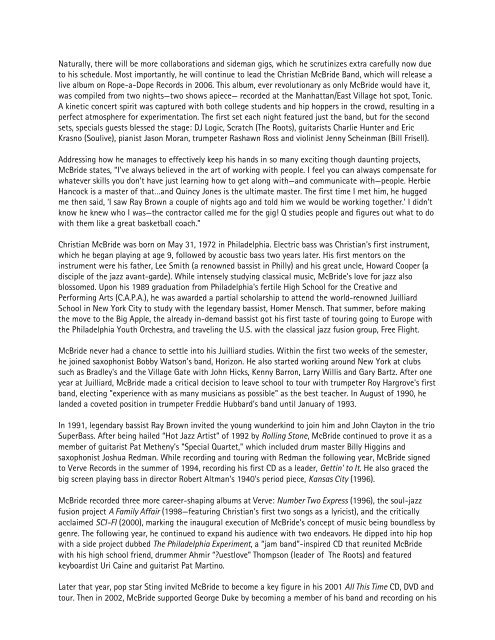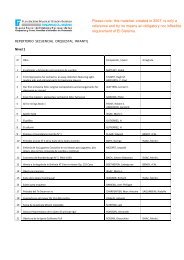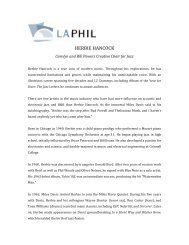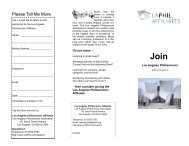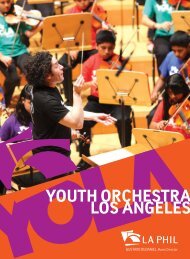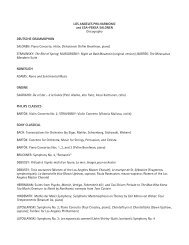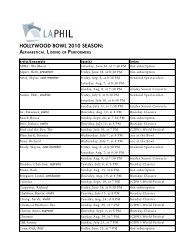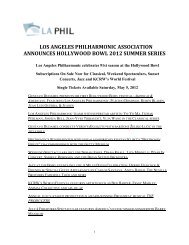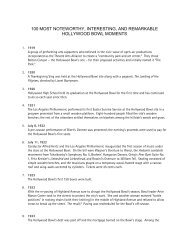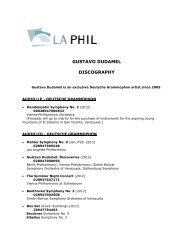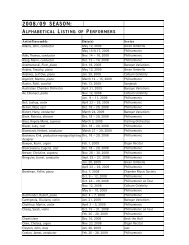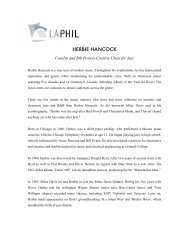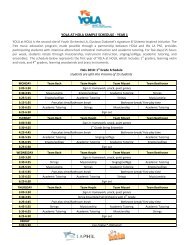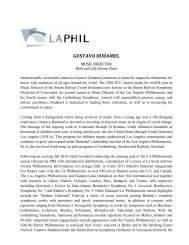McBride Biography - Los Angeles Philharmonic
McBride Biography - Los Angeles Philharmonic
McBride Biography - Los Angeles Philharmonic
You also want an ePaper? Increase the reach of your titles
YUMPU automatically turns print PDFs into web optimized ePapers that Google loves.
Naturally, there will be more collaborations and sideman gigs, which he scrutinizes extra carefully now dueto his schedule. Most importantly, he will continue to lead the Christian <strong>McBride</strong> Band, which will release alive album on Rope-a-Dope Records in 2006. This album, ever revolutionary as only <strong>McBride</strong> would have it,was compiled from two nights—two shows apiece— recorded at the Manhattan/East Village hot spot, Tonic.A kinetic concert spirit was captured with both college students and hip hoppers in the crowd, resulting in aperfect atmosphere for experimentation. The first set each night featured just the band, but for the secondsets, specials guests blessed the stage: DJ Logic, Scratch (The Roots), guitarists Charlie Hunter and EricKrasno (Soulive), pianist Jason Moran, trumpeter Rashawn Ross and violinist Jenny Scheinman (Bill Frisell).Addressing how he manages to effectively keep his hands in so many exciting though daunting projects,<strong>McBride</strong> states, “I’ve always believed in the art of working with people. I feel you can always compensate forwhatever skills you don't have just learning how to get along with—and communicate with—people. HerbieHancock is a master of that…and Quincy Jones is the ultimate master. The first time I met him, he huggedme then said, ‘I saw Ray Brown a couple of nights ago and told him we would be working together.’ I didn'tknow he knew who I was—the contractor called me for the gig! Q studies people and figures out what to dowith them like a great basketball coach.”Christian <strong>McBride</strong> was born on May 31, 1972 in Philadelphia. Electric bass was Christian's first instrument,which he began playing at age 9, followed by acoustic bass two years later. His first mentors on theinstrument were his father, Lee Smith (a renowned bassist in Philly) and his great uncle, Howard Cooper (adisciple of the jazz avant-garde). While intensely studying classical music, <strong>McBride</strong>'s love for jazz alsoblossomed. Upon his 1989 graduation from Philadelphia's fertile High School for the Creative andPerforming Arts (C.A.P.A.), he was awarded a partial scholarship to attend the world-renowned JuilliardSchool in New York City to study with the legendary bassist, Homer Mensch. That summer, before makingthe move to the Big Apple, the already in-demand bassist got his first taste of touring going to Europe withthe Philadelphia Youth Orchestra, and traveling the U.S. with the classical jazz fusion group, Free Flight.<strong>McBride</strong> never had a chance to settle into his Juilliard studies. Within the first two weeks of the semester,he joined saxophonist Bobby Watson's band, Horizon. He also started working around New York at clubssuch as Bradley's and the Village Gate with John Hicks, Kenny Barron, Larry Willis and Gary Bartz. After oneyear at Juilliard, <strong>McBride</strong> made a critical decision to leave school to tour with trumpeter Roy Hargrove's firstband, electing "experience with as many musicians as possible" as the best teacher. In August of 1990, helanded a coveted position in trumpeter Freddie Hubbard's band until January of 1993.In 1991, legendary bassist Ray Brown invited the young wunderkind to join him and John Clayton in the trioSuperBass. After being hailed “Hot Jazz Artist” of 1992 by Rolling Stone, <strong>McBride</strong> continued to prove it as amember of guitarist Pat Metheny's "Special Quartet," which included drum master Billy Higgins andsaxophonist Joshua Redman. While recording and touring with Redman the following year, <strong>McBride</strong> signedto Verve Records in the summer of 1994, recording his first CD as a leader, Gettin' to It. He also graced thebig screen playing bass in director Robert Altman's 1940's period piece, Kansas City (1996).<strong>McBride</strong> recorded three more career-shaping albums at Verve: Number Two Express (1996), the soul-jazzfusion project A Family Affair (1998—featuring Christian’s first two songs as a lyricist), and the criticallyacclaimed SCI-FI (2000), marking the inaugural execution of <strong>McBride</strong>’s concept of music being boundless bygenre. The following year, he continued to expand his audience with two endeavors. He dipped into hip hopwith a side project dubbed The Philadelphia Experiment, a “jam band”-inspired CD that reunited <strong>McBride</strong>with his high school friend, drummer Ahmir “?uestlove” Thompson (leader of The Roots) and featuredkeyboardist Uri Caine and guitarist Pat Martino.Later that year, pop star Sting invited <strong>McBride</strong> to become a key figure in his 2001 All This Time CD, DVD andtour. Then in 2002, <strong>McBride</strong> supported George Duke by becoming a member of his band and recording on his


